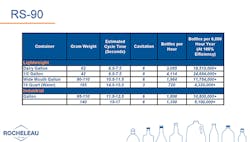The Rocheleau family motto, “fear no task,” goes back four generations. It’s also the motto of the family business, Rocheleau Tool and Die. It’s not just a statement. It’s a challenge to innovate and make better products that bring new benefits to customers. As one of the top manufacturers of blow-molding machines for the plastics and packaging industry, this motto has served us well.
Founded in 1938 in Leominster, Massachusetts, Rocheleau Tool and Die manufactures extrusion blow-molding machinery and related tooling and trimming automation systems to support the packaging industry worldwide. Just like the longstanding tradition of the Rocheleau family and company, our relationship with Mitsubishi Electric controls has been exclusive since the supplier moved from relay logic systems to programmable logic controllers (PLCs) in the late 1980s. Mitsubishi Electric’s automation technology is in every piece of equipment we produce, and we use that automation to control motors, temperature, pneumatics, hydraulics and other machinery conditions and actuators.
Rocheleau manufactures extrusion blow-molding machinery, blow molds, related automation equipment and blow-molded products. Our machines have the flexibility to produce customized, high-tolerance plastic containers and parts. We offer machinery and support worldwide, with customers in more than 40 countries.
The importance of machine controls is similar to the role of your car’s tires, says Kevin Hastings, electrical engineering manager, third-generation co-owner, and grandson of Rocheleau’s founder, Leopold “L.A.” Rocheleau. “No matter how well you build the car, if you have a flat tire, it’s not going to drive down the street,” says Hastings, “Controls are even more important to machines than tires are to cars. If they break down, nothing is going to work at all.”
If you drink juice or milk, put sugar in your coffee, use household-cleaning products or are a user of personal-care products, you’ve probably used one of the containers created on Rocheleau machines. And these containers are created incredibly fast, especially when they are created on Rocheleau’s flagship machine, the RS-90 extrusion blow-molding machine.
New generation of efficiency, power and speed
Rocheleau introduced its next-generation extrusion blow-molding machine at the same time we celebrated our 80th year in business. This first-ever six-head, 1-gallon blow-molding machine fills a need in high-volume packing applications. It tackles tubs and larger bottles at significantly faster cycle times.
How fast? It runs a six-cavity high-density polyethylene gallon in the mid-6-second range.
On a handful of occasions, a customer has asked Rocheleau to build a machine using a different brand of controls. Fortunately, in each case Kevin was able to talk them out of it. And the customers loved the machines and ordered more. The question of using different controls never came up again.
Market Challenges
Customers were looking for a choice in the high-volume high-density polyethylene (HDPE) container production market. Major issues for customers included maximizing energy efficiency and increasing available floor space. In a niche market, it is imperative to develop new technology to provide customers a competitive advantage: to make more product faster and with less energy in a reduced footprint and with minimal direct labor input.
Rocheleau’s Model RS-90, a 90-mm-diameter extrusion blow-molding machine addressed these issues. Its maximum HDPE processing output is 750 lb/hr. The RS-90 is capable of six-cavity gallon or eight-cavity half-gallon for dairy and other industrial applications (Figure 1).
We focused on our customer's challenges. Our engineering team developed the RS-90, beginning with a design for simple operation.
Our fresh approach directly addressed floor space required for the line. Our new clamp has 8-inch-thick solid steel platens, four working tie bars and a clamp frame with linear guide rails. This eliminated the need for center tie bars and allowed more than 8 inches of machine width savings. Additionally, utilization of the hydraulic drive motor and two injection cylinders pulling the extruder carriage reduced machine length by several feet.
Our engineers developed a post-mold cooling station with a centrifugal blower to provide rapid cooling of scrap plastic prior to entering the integrated de-flash station, continuing to reduce overall machine size.
In addition to the RS-90's size and functionality, energy efficiency was another major focus of our approach. The design to utilize a hybrid extruder drive combined the energy efficiency of an electric motor using a variable-frequency drive (VFD), a fixed displacement hydraulic gear pump and a high-efficiency hydraulic motor.
Dual 10-gallon accumulators are charged for efficient injection speed and clamping force. And energy-efficiency tests show usage of less than 100 kW at competitive cycle.
Our customers have told us that the RS-90 contributes to cost savings due to energy efficiency, fast cycle time and less unscheduled downtime. The RS-90 has also resulted in more customers partnering with Rocheleau to receive factory-experienced technical staff for support.
Also read: A clean adjustable speed drive installation
About the author
About the Author
Steve Rocheleau
Rocheleau Tool and Die

Leaders relevant to this article:

